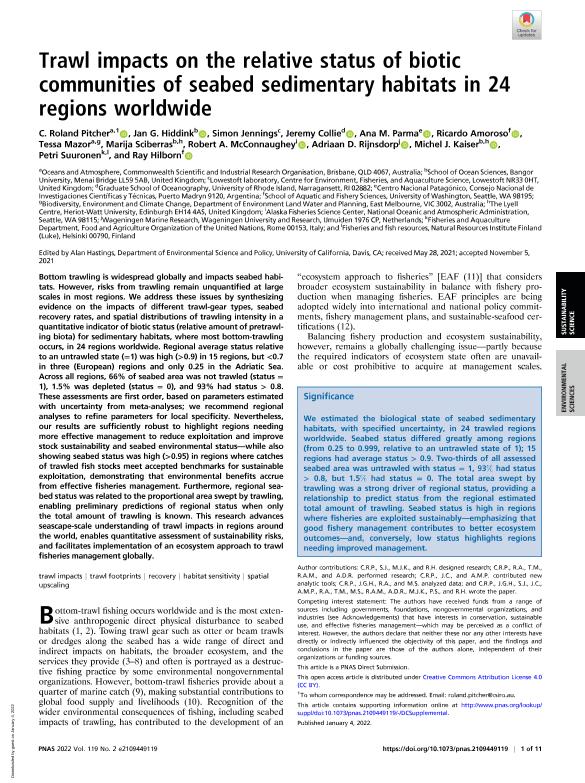Artículo
Trawl impacts on the relative status of biotic communities of seabed sedimentary habitats in 24 regions worldwide
Pitcher, Clifford Roland; Hiddink, Jan G.; Jennings, Simon; Collie, Jeremy; Parma, Ana María ; Amoroso, Ricardo Oscar
; Amoroso, Ricardo Oscar ; Mazor, Tessa; Sciberras, Marija; McConnaughey, Robert A.; Rijnsdorp, Adriaan D.; Kaiser, Michel J.; Suuronen, Petri; Hilborn, Ray
; Mazor, Tessa; Sciberras, Marija; McConnaughey, Robert A.; Rijnsdorp, Adriaan D.; Kaiser, Michel J.; Suuronen, Petri; Hilborn, Ray
 ; Amoroso, Ricardo Oscar
; Amoroso, Ricardo Oscar ; Mazor, Tessa; Sciberras, Marija; McConnaughey, Robert A.; Rijnsdorp, Adriaan D.; Kaiser, Michel J.; Suuronen, Petri; Hilborn, Ray
; Mazor, Tessa; Sciberras, Marija; McConnaughey, Robert A.; Rijnsdorp, Adriaan D.; Kaiser, Michel J.; Suuronen, Petri; Hilborn, Ray
Fecha de publicación:
01/2022
Editorial:
National Academy of Sciences
Revista:
Proceedings of the National Academy of Sciences of The United States of America
ISSN:
0027-8424
e-ISSN:
1091-6490
Idioma:
Inglés
Tipo de recurso:
Artículo publicado
Clasificación temática:
Resumen
Bottom trawling is widespread globally and impacts seabed habitats. However, risks from trawling remain unquantified at large scales in most regions. We address these issues by synthesizing evidence on the impacts of different trawl-gear types, seabed recovery rates, and spatial distributions of trawling intensity in a quantitative indicator of biotic status (relative amount of pretrawling biota) for sedimentary habitats, where most bottom-trawling occurs, in 24 regions worldwide. Regional average status relative to an untrawled state (=1) was high (>0.9) in 15 regions, but <0.7 in three (European) regions and only 0.25 in the Adriatic Sea. Across all regions, 66% of seabed area was not trawled (status = 1), 1.5% was depleted (status = 0), and 93% had status > 0.8. These assessments are first order, based on parameters estimated with uncertainty from meta-analyses; we recommend regional analyses to refine parameters for local specificity. Nevertheless, our results are sufficiently robust to highlight regions needing more effective management to reduce exploitation and improve stock sustainability and seabed environmental status—while also showing seabed status was high (>0.95) in regions where catches of trawled fish stocks meet accepted benchmarks for sustainable exploitation, demonstrating that environmental benefits accrue from effective fisheries management. Furthermore, regional seabed status was related to the proportional area swept by trawling, enabling preliminary predictions of regional status when only the total amount of trawling is known. This research advances seascape-scale understanding of trawl impacts in regions around the world, enables quantitative assessment of sustainability risks, and facilitates implementation of an ecosystem approach to trawl fisheries management globally.
Archivos asociados
Licencia
Identificadores
Colecciones
Articulos(CESIMAR)
Articulos de CENTRO PARA EL ESTUDIO DE SISTEMAS MARINOS
Articulos de CENTRO PARA EL ESTUDIO DE SISTEMAS MARINOS
Citación
Pitcher, Clifford Roland; Hiddink, Jan G.; Jennings, Simon; Collie, Jeremy; Parma, Ana María; et al.; Trawl impacts on the relative status of biotic communities of seabed sedimentary habitats in 24 regions worldwide; National Academy of Sciences; Proceedings of the National Academy of Sciences of The United States of America; 119; 2; 1-2022; 1-11; e2109449119
Compartir
Altmétricas



